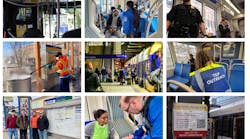As park-and-rides fill up, King County Metro will have extra staff monitoring park-and-rides with high rates of complaints and violations, such as Eastgate, Kingsgate, Redmond and Northgate, to make more room for transit customers and maintain a safe parking environment.
Metro’s Service Quality section, which monitors transit operations and facilities, will be looking for violations such as parking for non-transit purposes, blocking fire lanes or transit operations, or parking outside designated areas. Once enforcement starts June 12, drivers will be subject to two warnings – subsequent violations will result in having the vehicle towed.
In a Metro customer survey in 2016, 78 percent of respondents supported increased security and enforcement at park-and-rides.
“Metro’s goal is to ensure park-and-rides serve their intended purpose, which is to increase access to public transit,” said Christina O’Claire, assistant general manager for planning and customer service.
Customers can park at Metro park-and-rides if they are transferring to a bus, vanpool or carpool. Based on past staff research and observations, Metro estimates as many as 5 percent of park-and-ride spaces are used for non-authorized purposes. At the Eastgate lot in Bellevue, where 1,400 stalls often are full by 8 a.m., that could mean up to 70 spaces.
Metro provides service to 137 park-and-ride lots totaling more than 25,000 spaces in King County, but many lots are overcrowded. Demand is likely to increase as two Sound Transit park-and-rides – Overlake and South Bellevue — close this month for construction of East Link light rail.
Increased enforcement is one of several Metro efforts to create more park-and-ride space for transit customers. Metro leases park-and-ride spaces on available properties near transit hubs (provided at no cost to transit riders) and launched a Carpool Parking Permit program in February that allows drivers with two or more regular transit riders (average of three days of ridership per week) to reserve spaces at any of six area park-and-rides.
Metro also launched a new partnership with Diamond Parking Service that connects people with new fee-based parking on commercial and residential properties near major bus routes.


